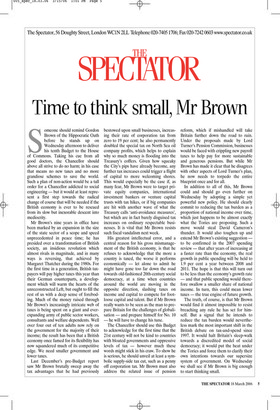Time to think small, Mr Brown
Someone should remind Gordon Brown of the Hippocratic Oath before he stands up on Wednesday afternoon to deliver his tenth Budget to the House of Commons. Taking his cue from all good doctors, the Chancellor should above all strive to do no harm; in his case that means no new taxes and no more grandiose schemes to save the world. Such a plan of non-action would be a tall order for a Chancellor addicted to social engineering — but it would at least represent a first step towards the radical change of course that will be needed if the British economy is ever to be rescued from its slow but inexorable descent into mediocrity.
Mr Brown’s nine years in office have been marked by an expansion in the size of the state sector of a scope and speed unprecedented in peace time; he has presided over a transformation of British society, an insidious revolution which almost rivals in magnitude, and in many ways is reversing, that achieved by Margaret Thatcher during the 1980s. For the first time in a generation, British taxpayers will pay higher taxes this year than their German counterparts, a development which will warm the hearts of the unreconstructed Left, but ought to fill the rest of us with a deep sense of foreboding. Much of the money raised through Mr Brown’s increasingly intricate web of taxes is being spent on a giant and everexpanding army of public sector workers, consultants and welfare dependents. Well over four out of ten adults now rely on the government for the majority of their income; the result has been that a British economy once famed for its flexibility has now squandered much of its competitive edge. We need smaller government and lower taxes.
Last December’s pre-Budget report saw Mr Brown brutally sweep away the tax advantages that he had previously bestowed upon small businesses, increasing their rate of corporation tax from zero to 19 per cent; he also permanently doubled the special tax on North Sea oil company profits, which helps to explain why so much money is flooding into the Treasury’s coffers. Given how squeaky the City’s pips have already become, any further tax increases could trigger a flight of capital to more welcoming shores. This would especially be the case if, as many fear, Mr Brown were to target private equity companies, international investment bankers or venture capital trusts with tax hikes, or if big companies are hit with another wave of what the Treasury calls ‘anti-avoidance measures’, but which are in fact barely disguised tax increases on ordinary respectable businesses. It is vital that Mr Brown resists such fiscal vandalism next week.
His greatest intellectual error, and a central reason for his gross mismanagement of the British economy, is that he refuses to acknowledge that the more a country is taxed, the worse it performs economically — let alone to admit he might have gone too far down the road towards old-fashioned 20th-century social democracy, at a time when countries around the world are moving in the opposite direction, slashing taxes on income and capital to compete for footloose capital and talent. But if Mr Brown really wants to be seen as the man to prepare Britain for the challenges of globalisation — and prepare himself for No. 10 — he will have to change his tune.
The Chancellor should use this Budget to acknowledge for the first time that the 21st century will not be kind to countries with bloated governments and oppressive levels of tax — however much these words might stick in his craw. To show he is serious, he should unveil at least a symbolic supply-side tax cut, such as a penny off corporation tax. Mr Brown must also address the related issue of pension reform, which if mishandled will take Britain further down the road to ruin. Under the proposals made by Lord Turner’s Pension Commission, businesses would be faced with crippling new payroll taxes to help pay for more sustainable and generous pensions. But while Mr Brown has made it clear that he disagrees with other aspects of Lord Turner’s plan, he now needs to torpedo the entire blueprint once and for all.
In addition to all of this, Mr Brown could and should go even further on Wednesday by adopting a simple yet powerful new policy. He should clearly commit to reducing the tax burden as a proportion of national income over time, which just happens to be almost exactly what the Tories are proposing. Such a move would steal David Cameron’s thunder. It would also toughen up and extend Mr Brown’s existing suggestion to be confirmed in the 2007 spending review — that after years of increasing at a faster rate than the economy, the real growth in public spending will be held to 1.9 per cent a year between 2008 and 2011. The hope is that this will turn out to be less than the economy’s growth rate — and that public spending would therefore swallow a smaller share of national income. In turn, this could mean lower taxes — the true engine of future growth.
The truth, of course, is that Mr Brown would find it almost impossible to resist breaching any rule he has set for himself. But a signal that he intends to reduce the tax burden would nevertheless mark the most important shift in the British debate on tax-and-spend since 1997. It would halt Britain’s sleep-walk towards a discredited model of social democracy; it would put the heat under the Tories and force them to clarify their own intentions towards our supersize system of government. On Wednesday we shall see if Mr Brown is big enough to start thinking small.


















































































 Previous page
Previous page